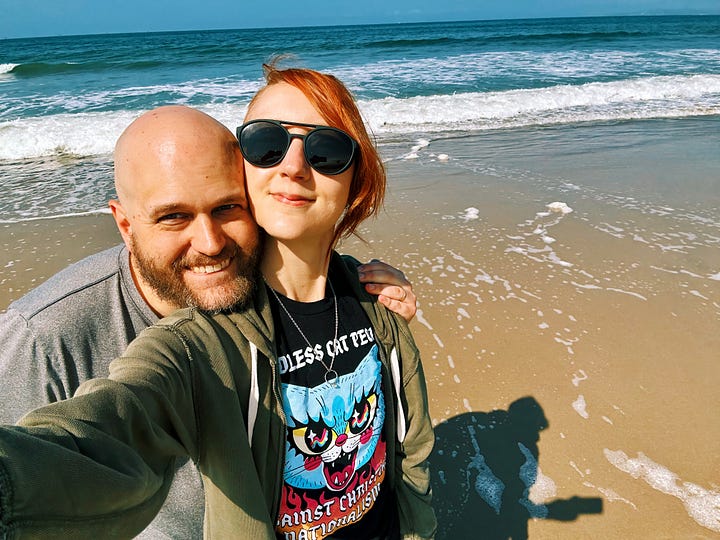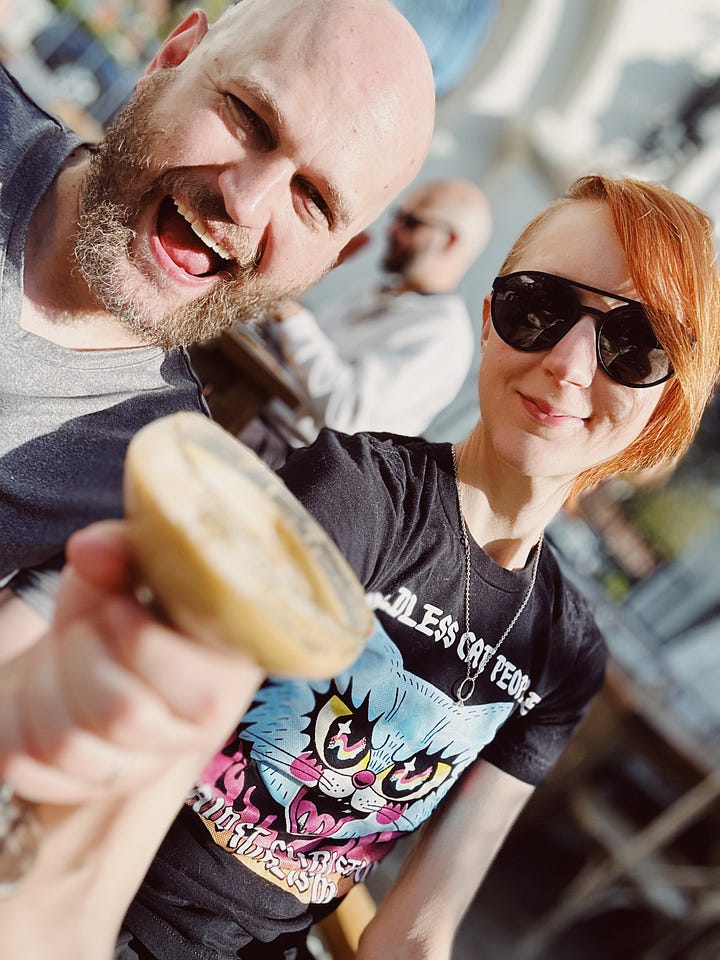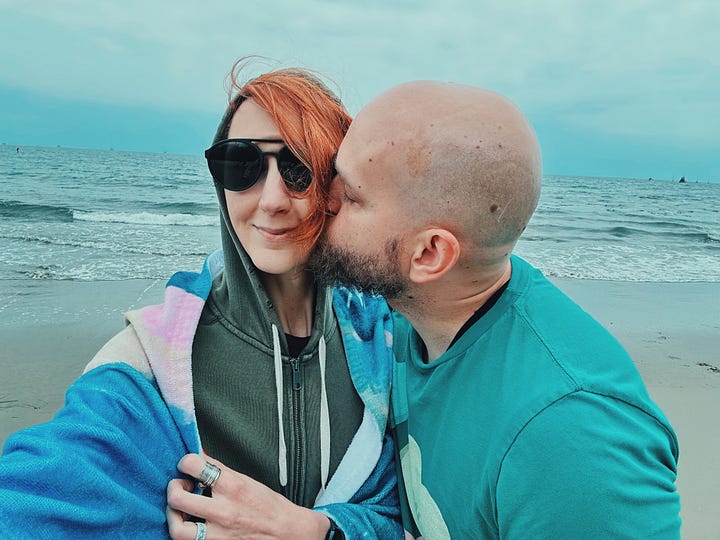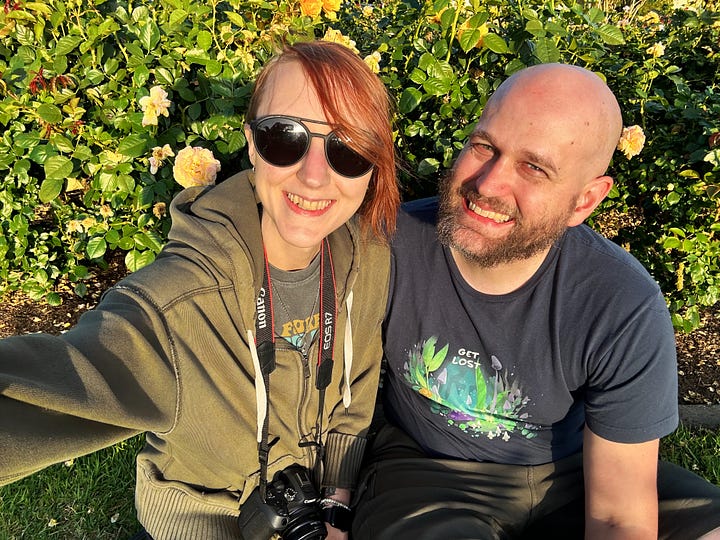Uneven weight and the lie of unworthiness
When we started dating, I was sure my boyfriend wouldn't stick around for someone with a body my size.
[Content note: eating disorders and brief mention of nondescript numbers]
The night was flushed with fluorescent streetlights on my college campus as Jordan and I walked around the grounds. Thick Texas May air clung to our skin, hovering over plush green grass.
That day, Jordan had bravely soldiered on through the constraints that my culture placed on me: he’d asked for my father’s permission to court me. He’d called a family meeting over my dad’s lunch break from work, inviting everyone into the living room to announce that we were officially a couple.
It probably all sounds very 1800s. It kind of was.
After five years of deep friendship, we were something new.
Walking around campus was our one real way to get alone time, since dates were frowned upon and we weren’t allowed to be alone in a room with a closed door. So we walked. And I, who had been in love with Jordan since I was 15, found myself voicing countless stumbling versions of “what now?”
“There’s a lot I don’t know,” he said at one point, stopping me. And he was being honest: he, too, had no clue what he was doing. “But I do want you to know that you’re beautiful.”
We stopped, and I briefly dared to make rare eye contact with him, punctuating the vulnerability of the moment. Then he gently wrapped me in a hug.
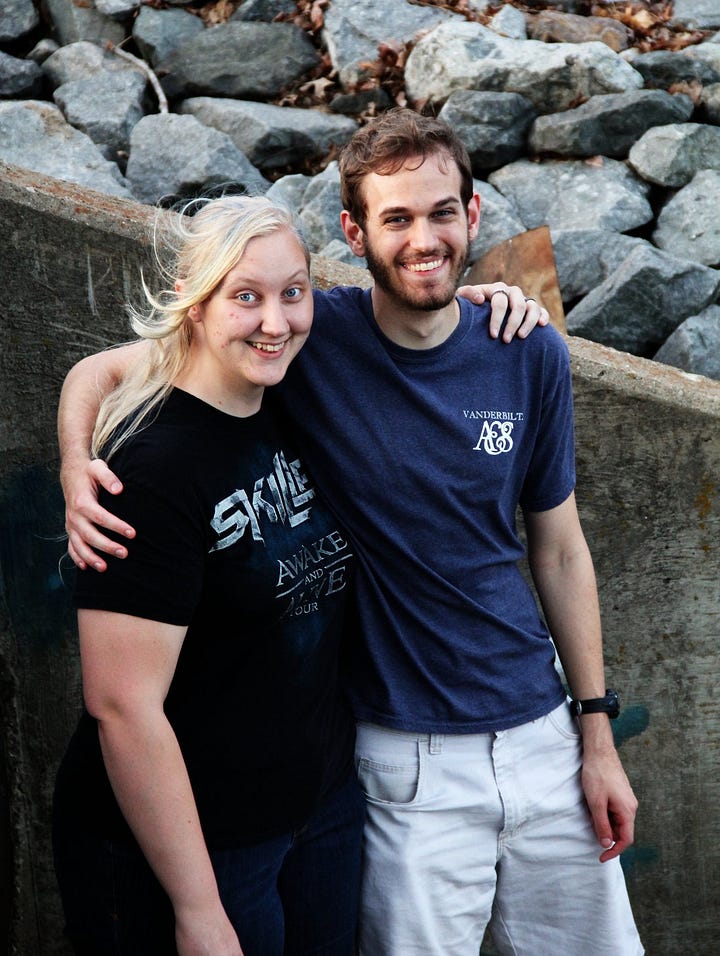
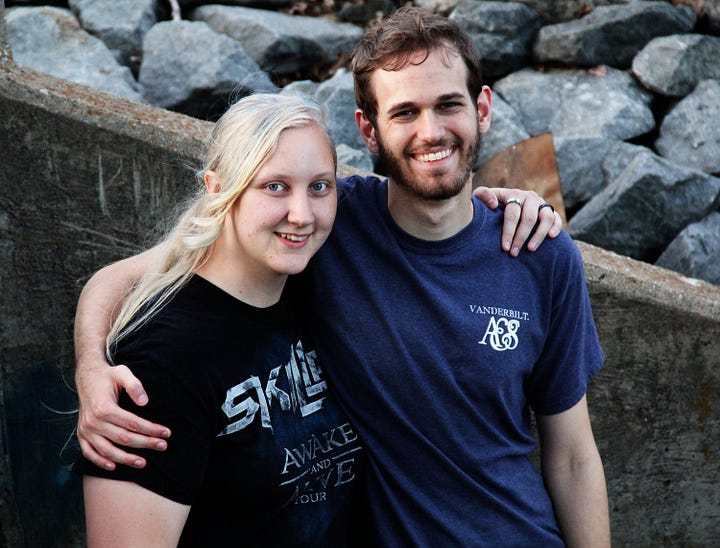
I was 20 years old, had a devastating and silent eating disorder, and was at the highest weight of my life. Most people do not understand that those things can coexist, but the statistics state that less than 6% of people with eating disorders are clinically underweight. Throughout my teenage years, I fluctuated in size some as I starved, but mostly I stayed teetering on what the medical establishment would call “obese,” bordering on “morbidly obese” (terms I use in quotes because I wholly reject them based on the insanely racist, sexist, and faulty science behind the BMI). When Jordan and I started dating, I was more than 100 pounds heavier than he was.
This is not how the story is supposed to go, my anguished brain told me. Women are supposed to be small, delicate, and needless things. Instead, at almost 6 feet tall and in a larger frame, I was hopelessly mismatched with my lanky partner. Plus, my clothing rules growing up had been so rigid that my wardrobe at the time consisted entirely of the two rebellions I’d chosen: bootcut jeans and black band t-shirts. I had worn makeup only twice in my life. I had never had a professional haircut. I was not conventionally attractive by any metric I knew to use. I had never in my life seen any kind of story or song represent a romance that felt so mismatched. It drove my wounded insecurity deeper under my skin, a splinter, a shame.
I worried constantly about what people would think of us when we were in public. I had heard enough snide commentary about other couples to know that we would seem unequal, that I was in no way “a catch,” that society would not exactly be impressed with the person Jordan had chosen. I felt this insecurity bleed into visits to see him at the prestigious Vanderbilt University, where he was on a full-ride scholarship with a double major in math and computer science, with a PhD in his sights. Here was a brilliant, kind, funny middle-class boy who could sing, write poetry, was involved in choir and ministry groups on campus, and fit the conventional body demands of society.
Then there was me: starving but still in a larger body, scarred-up from self-harm, deeply traumatized, fighting my way through college and 40-hour work weeks after a childhood of poverty and homeschool, dressed like the back row social outcast that I absolutely was in college.
These are the parts no one wants to talk about. In an appearance-obsessed society (specifically, a thinness-obsessed society), how do you handle really obvious size differences in couples?
How do you navigate a long-term relationship when an eating disorder is always the third person in the room?
How do you work out an equitable relationship with intense differences in mental functioning or physical wellness, even?
Our cultural climate has stoked a wildfire of insecurity that many partnerships can’t survive. There is constant pressure around who deserves to be with whom. “Better” or “worse” traits are ranked and codified, determining who is allowed to hope for love and who is expected to just settle.
Internalized weight stigma, in particular, can even be directed towards each other — a silent saboteur. We have culturally agreed that stigmatizing mixed-race relationships is insanely regressive. Yet somehow, people still get away with publishing mind-numbing think pieces on “mixed weight relationships” (which every relationship is, as Virginia Sole-Smith rightly pointed out).
“I never want you to lose weight for me.”
Jordan spoke those words emphatically the week we got engaged, a year into dating, as we walked over a dusty bridge deep in the Colorado mountains.
I tried to believe him.
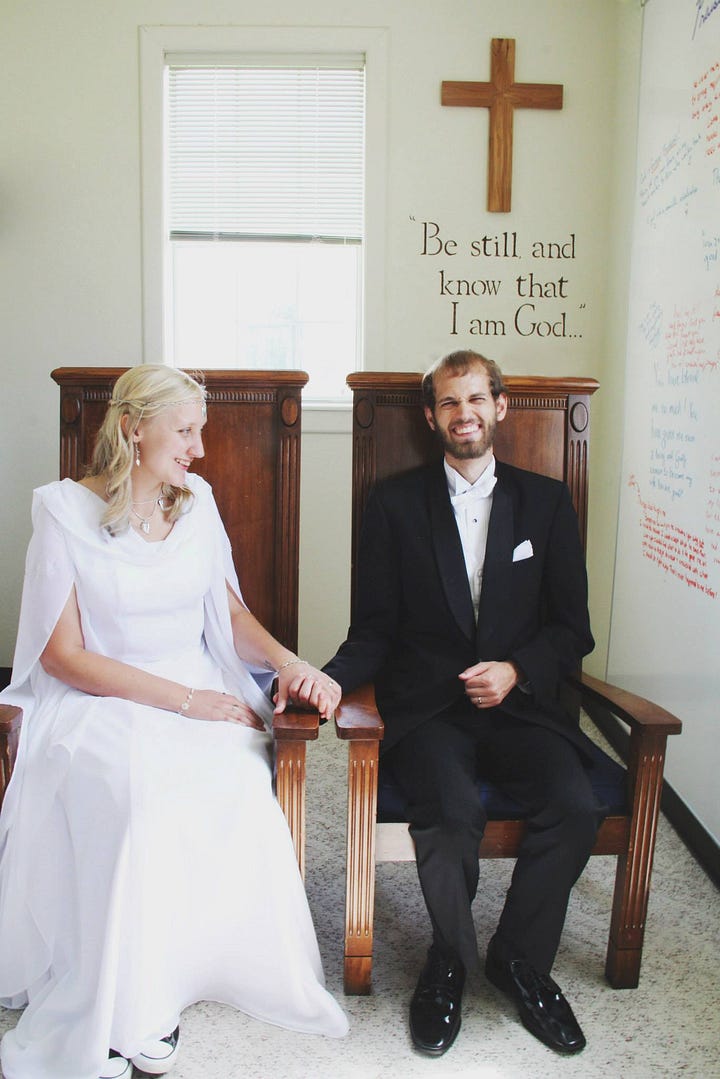
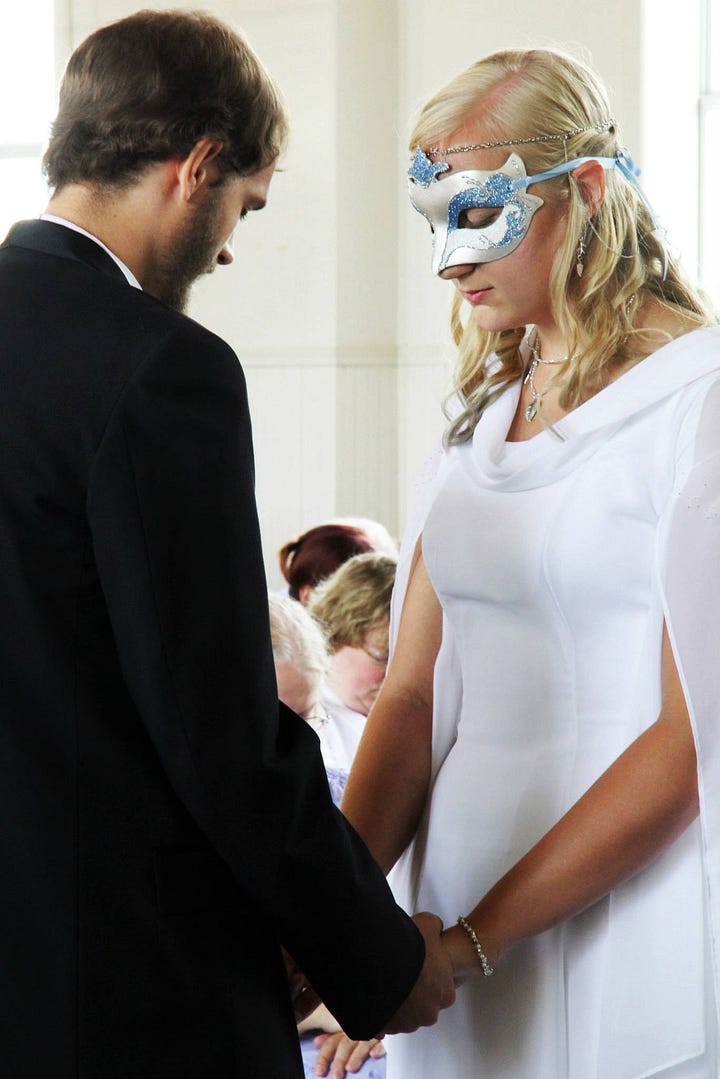
It’s not lost on me, the strangeness of the plot twists life has taken. I am now less than half the body size that I was when Jordan asked my father for permission to pursue me. I used to dream of looking small and fragile next to him; now, I do. To the point that on our recent 12th anniversary trip, someone asked if I was a minor traveling with him (and yes, we will be milking that joke for the foreseeable future).
This has brought a whole other host of problems. As I’ve written about one therapist infamously telling me, I sat under the words “Jordan will leave you if you don’t recover. He can only put up with this for so long.”
More recently, a therapist in a treatment center was hearing about the limitations of my trauma, my intense self-disgust, and my Severe and Enduring Anorexia Nervosa diagnosis.
“Why aren’t you allowing yourself to consider the possibility that you should let Jordan leave you so he can find someone who can meet his needs?” she asked me.
I almost laughed before responding: not only have I presented him with the possibility of him leaving. In my lowest self-loathing moments, I have begged him to. I have been acutely aware of all of the reasons why we shouldn’t work on paper. I am exquisitely conscious that since day one, there have been factors that social narratives would designate as a death sentence for our long-term partnership. I have felt to my bones that I am bad for him.
I went from being too big as a reason we should separate to being too sick and small as a reason. Throughout our partnership, I have worn sizes ranging from 22 to 0.
In reality, this has had absolutely no bearing on my capacity to connect with another work-in-progress human being. But this dichotomy serves as an avatar for the truth: my wounded psyche will always find some reason why I don’t deserve him. I will always be too much or too little. I have been sick, I have been well. I have been desperate, I have been numb. I have been loud, I have been silent. I will always be able to fabricate a reason why I make his life (or anyone’s life) worse.
If I’ve learned anything from this process, from the extremes we have lived, it is this: the cultural narratives about coupleship are garbage. All of the hierarchies are made up. There should be nothing worth noting about people with seemingly different appearances or abilities pairing up.
If you’re thinking in terms of love being about deserving, you’ve already veered away from talking about actual love. You’re talking about transaction, about calculation, about cost/benefit analysis and ROI.
One thin body plus one thin body equals one fairytale love, right?
This is shockingly dehumanizing (even deranged) when you say it. But it’s still the story media tells, still the story we secretly internalize when our aching hearts reach to be seen, known, and loved.
If I were to offer anything from someone who has lived these extremes, it would be this: what makes a partnership work is the fully autonomous, fully consensual, and fully empowered choosing of each other. No more, no less.
When I’ve begged Jordan to leave my broken, messed-up self, he’s half-playfully, half-firmly responded, “Are you saying you want to take away my choice? I choose you, Mary. I choose to stay. You don’t get to choose for me.”
He knows that because I value granting freedom as a form of healing love, it will always be the clincher for me if he brings me back to my value of revering agency.
And in the same way, I also have to choose. Choosing Jordan has largely been a no-brainer. But I also have to choose to accept the commitment that is being offered to me, even when I can’t cognitively grasp it.
When I’m big and when I’m small. When I’m healthy and solid, and when I’m sickened and slight.
Because love has never been about merit-matching. It’s something a little more like a freedom.
